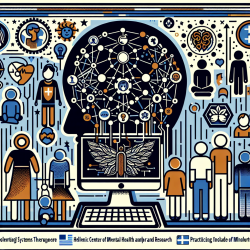As online therapy continues to gain traction, practitioners must remain abreast of the latest research to provide the best care possible. A recent study titled The impact of ‘grounds’ on abortion-related outcomes: a synthesis of legal and health evidence offers valuable insights that can be adapted to improve therapy practices, particularly in special education and mental health settings.
Understanding the Research
The study, conducted by de Londras, Cleeve, Rodriguez, and Lavelanet (2022), examines the effects of grounds-based approaches to abortion regulation on health and non-health outcomes. The findings indicate that restrictive legal frameworks negatively impact access to quality abortion care and the human rights of pregnant individuals. The research highlights the importance of enabling access to abortion on request to enhance rights and improve health outcomes.
Key Findings and Their Implications for Online Therapy
The research identifies several outcomes of grounds-based approaches that can inform online therapy practices:
- Delayed Access: Restrictive regulations cause delays in accessing services, leading to adverse health outcomes. In online therapy, reducing barriers and ensuring timely access to services can prevent exacerbation of mental health issues.
- Continuation of Unwanted Conditions: Just as restrictive abortion laws can force the continuation of unwanted pregnancies, delayed or inaccessible therapy can lead to prolonged mental health conditions. Practitioners should advocate for policies that ensure prompt and continuous access to therapy.
- Opportunity Costs: The need to navigate complex legal systems imposes financial, emotional, and time costs. Simplifying the process of accessing online therapy can mitigate these costs for clients.
- Unlawful Alternatives: When legal pathways are restrictive, individuals may resort to unsafe alternatives. Ensuring that online therapy is easily accessible and widely available can prevent clients from seeking unverified or unsafe mental health solutions.
- Reproductive Coercion: Restrictive laws can lead to coercion and denial of services. In therapy, it is crucial to create a supportive environment where clients feel empowered to make decisions about their care without coercion.
- Disproportionate Impact: Restrictive laws disproportionately affect marginalized groups. Online therapy platforms should strive to be inclusive and accessible to all, particularly those from underserved communities.
Implementing Evidence-Based Practices
Practitioners can draw from these findings to enhance their online therapy services:
- Reduce Barriers: Streamline the process of accessing therapy by minimizing bureaucratic hurdles and offering flexible scheduling options.
- Timely Interventions: Prioritize early intervention to prevent the escalation of mental health issues. Use telehealth tools to provide immediate support when needed.
- Client-Centered Care: Foster an environment that respects clients' autonomy and decision-making. Encourage open communication and shared decision-making in therapy sessions.
- Inclusivity and Accessibility: Ensure that therapy services are accessible to all, regardless of socioeconomic status, geographic location, or other barriers. Provide resources and support tailored to the needs of marginalized communities.
Encouraging Further Research
While this study provides valuable insights, further research is needed to explore the specific implications for online therapy. Practitioners are encouraged to stay informed about the latest research and to participate in studies that examine the effectiveness of online therapy interventions.
To read the original research paper, please follow this link: The impact of ‘grounds’ on abortion-related outcomes: a synthesis of legal and health evidence.










